Search
Showing 10 of 1702 results for the cuzzy rolly, latest
-
Māori and First Nations people connect during University of Toronto visit
18 indigenous students and two indigenous staff from the University of Toronto’s ‘First Nations House’ were invited to Aotearoa New Zealand for a week-long visit at Tirorangi Marae at the base of Mount Ruapehu in July.
The purpose of the visit was to enhance cross-cultural understanding between Māori and First Nations and Métis peoples and is significant as empowering iwi and hapū in the international education space is an important Te Tiriti obligation for ENZ, as an Aotearoa New Zealand government agency.
The visit took place during the time of ‘Puanga’ which is when the single star rises higher in the sky than the Matariki star cluster and is recognised by iwi and hapū that can’t see the Matariki cluster from their location.
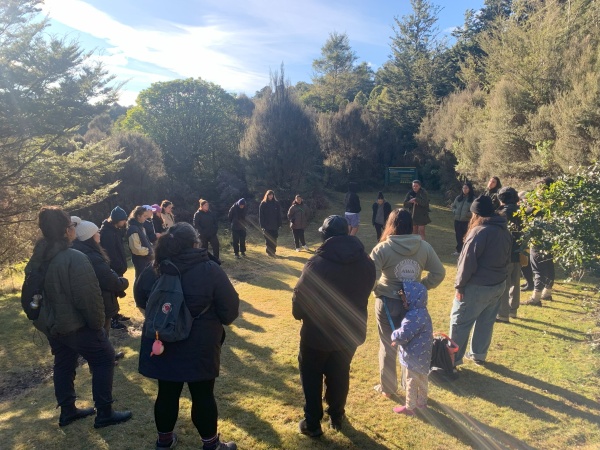
Māori and First Nations and Métis people have ’sharing circles’ as a common way to teach and learn.
The group participated in a wide range of activities in the area while staying at the marae. They were then welcomed to Te Whanganui-a-Tara by the ENZ Wellington office, visiting Te Tiriti o Waitangi at Archives New Zealand Te Rua Mahara o te Kāwanatanga and and Te Herenga Waka — Victoria University of Wellington, before finishing their trip in Whakatū (Nelson) with some adventure tourism activities.
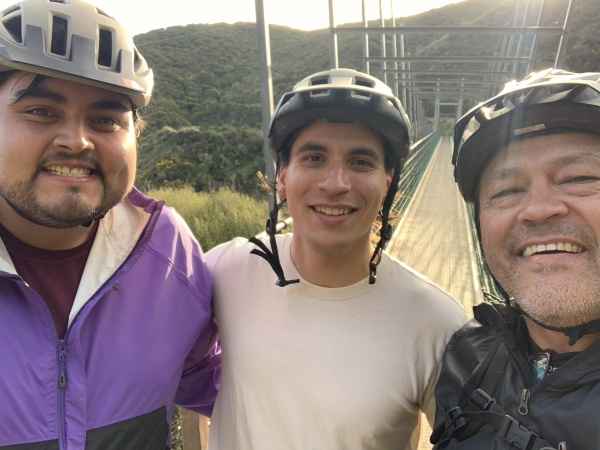
Indigenous students Kieren and Bailey from the University of Toronto sampling Wellington’s outdoors with ENZ's Craig Rofe.
The First Nations and Métis members of the group experienced what living on a marae was like and were also immersed in how a tribe engages with the environment, and how iwi businesses, local council and government agencies such as the Department of Conservation (DOC) operate in the field with iwi partnership.
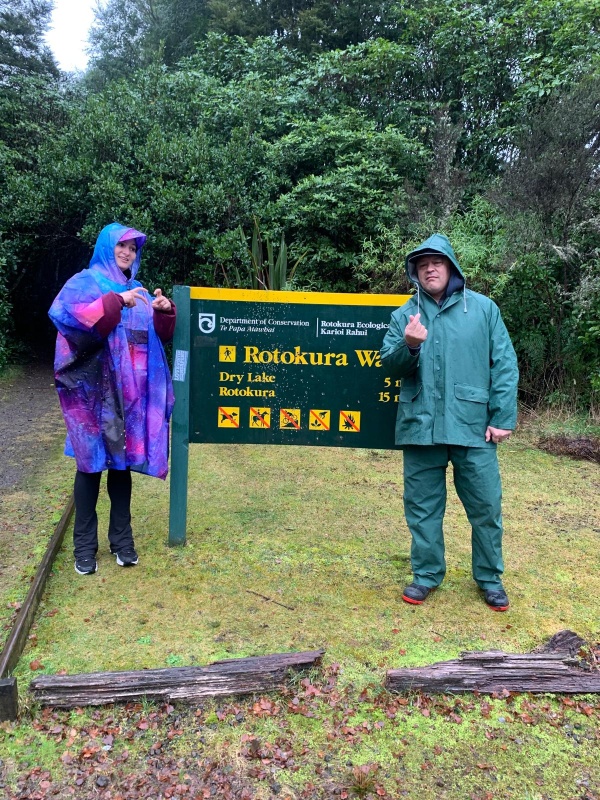
Iwi people sharing lake Rotokura’s healing power, a wāhi tapu (sacred place) for the local tribe.
Dr Craig Rofe, ENZ’s Kaitohutohu Matua Māori – Senior Advisor Māori, said that during the visit, Māori and First Nations and Métis people were able to compare the similarities and differences of their contexts to grow understand of their respective challenges and successes.
“The First Nations people’s struggles to overcome racism and prejudice resonated with tangata whenua, in particular the intentional elimination of language and the current mechanisms of revitalisation.
“Many stories shared with together showed the everyday trauma that resides in each of us and how, as indigenous people, we try to navigate these obstacles to make a better world for the next generation”, said Dr Rofe.
The trip motivated the students to connect more with their languages and culture upon their return.
Kenzie, from the Mohawk tribe said “when we meet again, I’ll be able to talk to you in my language, I’m declaring it!”.
Katherine from the Eskasoni First Nation tribe said “My experience connecting with the Ngāti Rangi revealed the transformative power of global Indigenous connections. Participating in ceremonies such as Hautapu and visiting Mount Ruapehu was particularly moving. Listening to their stories of ancestral ties to the land and taking part in traditional ceremonies that emphasized community and connection to the environment deepened my own personal understanding. This experience inspired me to initiate conversations with elders in my own community about our traditional land management practices.”
This experience also highlights the important offerings that Māori, and indeed indigenous knowledge, has to offer to international education. In particular, and not exclusively, the deep connection that indigenous peoples have with the environment and therefore natural obligation of care.

First Nation student, Alexis, discovers the origins, medicinal, spiritual and mechanical properties of harakeke (flax).
Sustainable practices and programmes can benefit from indigenous inclusion and perspectives, especially with the large-scale impacts of global warming and general pollution in many countries. The co-governance structure that Ngāti Rangi iwi and DOC work with as part of post Te Tiriti Settlement was used as an example of decolonised solutions within our New Zealand context.
There have been discussions between ENZ, Ngāti Rangi iwi, and the University of Toronto about an ongoing relationship and considering what a reciprocal engagement might look like moving forward.
Nāku te ika i hī, nāku anō i whakatau
Ki te haere, whāia i te Pare-i-te-taitonga, tērā taku ika.
This is a Ngāti Rangi iwi reference to the Ruapehu mountain being the ‘pillar post’ of the ‘Fish’ (North Island).
-
International student speakers lay the wero at NZIEC KI TUA
Sean Teow, Aria Ngārimu, Ibuki Nishida, and Albert Lu, each shared stories and insights with NZIEC KI TUA attendees that offered a reminder to those working in international education about why they do what they do.
The students’ speeches laid a worthy wero for the international education sector to continue the good work and keep international students at the centre of our work long after they arrive in New Zealand.
In this context, a wero is a traditional Māori challenge, performed by Māori warriors at a pōwhiri to test the intentions of visitors – by wielding weapons and laying down the challenge, with a token, such as a small branch for visitors to pick up and show they come in peace. Wero can also be used to convey a 'challenge' in other settings besides the traditional usage.
President of the New Zealand International Students' Association (NZISA), Sean Teow (Malaysia), spoke candidly about the full range of his student experience – offering insights on how he came to choose New Zealand to what the international education sector could focus on to better the student experience further.

Sean Teow speaks at NZIEC KI TUA.
Sean spoke about the need to focus on the “level of heart” that New Zealand exudes when interacting with prospective students alongside “bread and butter” attributes such as the high quality of education, lifestyle and beautiful natural environment.
“Be proud of the quality of New Zealand education, but also you as people, there is a level of heart that exudes itself when talking to students. That intention can be felt by a prospective student who may be afraid and anxious to embark on that path, a simple feeling that these people know how to take care of me, and they mean well.
“Don’t forget that the next time you recruit or interact with students for that could make the very difference with students remembering New Zealand and enjoying their time here. Embrace and embody manaakitanga,” Sean urged delegates.
Prime Minister’s Scholarship recipient Aria Ngārimu (Ngāti Porou, Ngāti Kahungunu ki Wairoa, Rongomaiwāhine, Te Whānau-ā-Apanui), a domestic student at Te Herenga Waka - Victoria University of Wellington visited India as part of her scholarship experience.

Aria Ngārimu at the Taj Mahal in Agra, India during her scholarship experience. Photo credit: Aria Ngārimu.
In her address, Aria aptly used an Indian folk tale of five blind men attempting to describe an elephant that they had encountered for the first time to highlight how individual perspectives can be wildly different yet equally accurate. Her speech was a powerful reminder of the need to be open to points of view different from our own.
International representative of the University of Otago Students' Association, Ibuki Nishida (Japan), offered a challenge to the sector to remember that every international student has a story and the importance of staying connected to their experience and story while they were in the country.

Ibuki Nishida laid a wero for the sector to remember that every student has a story.
“Don’t forget about those of us that are already here. I challenge you to not set a “finish line”, but instead learn from, and be a part of, each student’s ongoing story while we are here, that we can take to our loved ones to inspire them back home.
“Do not underestimate the power of word-of-mouth. When looking at growth, it might be one of the most important. And the way you tap into that, is to make sure students have a great experience while they’re here too. And remember that each international student is a story waiting to be told. So help us make it one for the books,” Ibuki said.

Albert Lu spoke about the differences in school life in his native Taiwan and New Zealand and what he likes about studying in Wellington.
Albert Lu (Taiwan), a Year 11 student at Wellington High School, noted the differences in life in Taiwan and New Zealand as he spoke about his experience in New Zealand.
Albert spoke about the NCEA curriculum providing an opportunity to students to enjoy a good balanced lifestyle, how confidence was the key to settling into life in New Zealand and importantly, ‘another way to improve language faster is to hang out with friends whose first language is not my first language’. Albert does this through joining student groups, attending church and generally being proactive about life here in New Zealand.
“Everyone is friendly, I love it,” Albert said.
*Wero: In this context, a wero is a traditional Māori challenge, performed by Māori warriors at a pōwhiri to test the intentions of visitors – by wielding weapons and laying down the challenge, with a token, such as a small branch for visitors to pick up and show they come in peace. Wero can also be used to convey a 'challenge' in other settings besides the traditional usage.
-
Find out more about what international students think about their NZ experience
Director of Insights for Education New Zealand Manapou ki te Ao (ENZ), Marie Clark, and Student Experience Manager, Ross Crosson will be hosting a webinar on 22 August 2024 from 7-8pm NZST on the recently released 2024 Student Experience Survey results. The webinar is for anyone in our sector who is interested in delving more into the data.
Marie and Ross will talk about the overall student experience for international students enrolled with a New Zealand education provider and where improvements can be made to enhance the international student experience.
You can register via the following link: https://enz.zoom.us/s/81600505051
If you can't make the live session, a recording will be available on Intellilab from Friday.
ENZ’s media release which includes links to the report and data sets can be found on our website - Rise in international students rating New Zealand experience positively » Education NZ (enz.govt.nz) .
-
Special offer on ICEF Academy NZ Education Agent Course
ICEF Academy, the professional training arm of ICEF, has launched a new online course that is designed to equip education agents with the resources they need to provide the highest quality of guidance to students wishing to study in Aotearoa New Zealand.
The New Zealand Education Agent Course (NZEAC) has been developed in collaboration with Education New Zealand Manapou ki te Ao (ENZ) and adds to the ICEF Academy’s portfolio of destination training.
ICEF is now offering a promotional rate for readers of E-News. Education agents can use the code NZEAC30 during checkout to purchase the exam with a 30% discount. This offer is available until 31 December 2024.
Since its 27 June launch date, the course is already proving popular. As of 14 August, 618 education agents have enrolled in the course, 532 have started, 127 have completed the course, and 16 have graduated.
Commenting on the course’s uptake, Sahinde Pala, General Manager Sector Services at ENZ said it was encouraging to see that the course was proving popular amongst education agents.
About the course itself, she said “The course offers comprehensive insights for education agents to help them advise students on study in Aotearoa New Zealand. It will help them become better informed about the country’s policies, culture and education system so that their advice to students is current, accurate and helpful.”
In undertaking this course, education agents will have the opportunity to study modules which will encompass New Zealand’s culture and history, education system, work policies and legislation, as well as effective student recruitment and support. The course is self-paced and free, however those seeking to highlight their knowledge as a destination New Zealand specialist have the option to undertake a paid certification exam, for which the 30% discount applies.
Education Agents interested in learning more about the New Zealand Education Agent Course can learn more at: New Zealand Education Agent Course (NZEAC) | ICEF Academy. Education agents are also reminded to register with AgentLab to keep up-to-date with all agent-related news and information.
-
ENZ reflections on NZIEC KI TUA 2024
ENZ’s Acting Director International, Ben Burrowes summed his experience up succinctly and said....
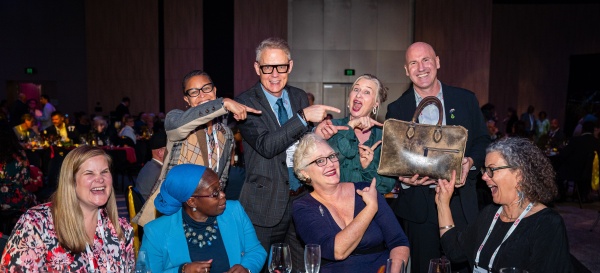
“As always, I found the conference to be an awesome opportunity to connect face-to-face with my colleagues and friends across the sector. It was hugely helpful to discuss (in-person) their areas of focus and how we can continue to align ENZ’s International team’s work alongside them”.
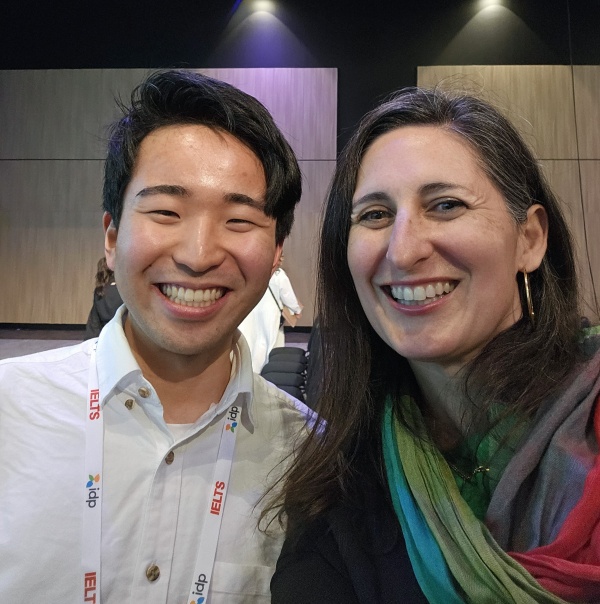
General Manager Sector Services Sahinde Pala with international student Ibuki Nishida.
General Manager Sector Services, Sahinde Pala, said....
“It was wonderful to see so many colleagues from across the global international education sector connecting with each other over the 2 ½ days of NZIEC KI TUA. Attendees and speakers brought a global approach to thoughts and reflections and was a reminder of the environment within which we’re working. The extended networking breaks saw much cross-sector collaboration and sharing of good practice.
“The attendance and speech by the President of India, Smt. Droupadi Murmu, was a great honour – the President reflected on the importance of international education for communities as well as the individual, how transformative education has been for her during her life, and the value of Indian international students in NZ,” said Sahinde.
“Dr Fanta Aw was a crowd favourite, with her reflections on the complimentary nature of international education alongside domestic education and the opportunity for us to collaborate globally given the societal value it brings to our communities and countries.
“My absolute highlight is always the student speakers, who threw down the wero (challenge) to delegates to keep focused on the importance of striving to deliver an excellent student experience,” Sahinde added.
I’m really proud of the whole ENZ whānau who collaborated to put on yet another successful NZIEC KI TUA”.
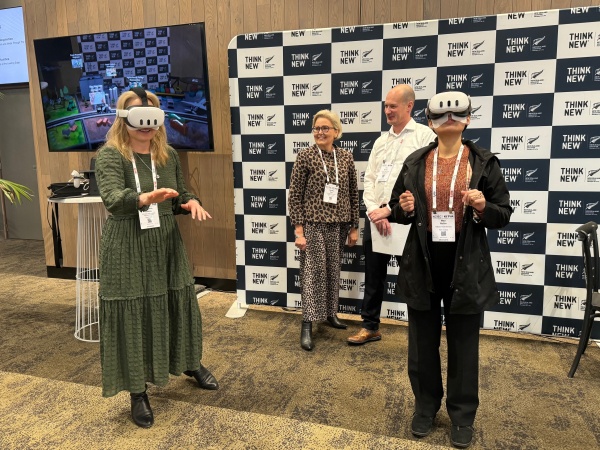
ENZ’s General Manager Sector Engagement, Innovation and Growth, Wendy Kerr (pictured second from left) said that attending NZIEC was incredibly energising.
“I was impressed by our teams combined approach to developing new areas for high value growth. Adrian Hirst, ENZ’s Director of Marketing, spoke passionately about the challenge of standing out in the competitive international education market. His words resonated with me: “In a sea of competing destinations, it’s increasingly difficult to stand out.” It really made me think about the importance of creating a unique identity that speaks to prospective students and their families," said Wendy.
"Christina Gomes, our Director of Innovation and Growth, shared an exciting framework that aligns global demand with New Zealand’s strengths. I was particularly drawn to her insights on the agri-food sector, which highlighted New Zealand's expertise and global reputation. This provides an anchor to develop our unique identity and secure additional learners by targeting a new segment".
Wendy added, "Tim Brown introduced a new “mixed reality” tool designed to immerse prospective students in the New Zealand agri-food systems career opportunities and study experience".
"I left the conference feeling energised and hopeful about these initiatives, knowing they could accelerate how we attract additional international students and showcase the incredible opportunities that New Zealand offers. It was a reminder of the exciting future ahead for our education sector!" -
INZ student visa update: August 2024
Post Study Work Visa – cross crediting study from post graduate diploma to masters
Provided eligibility is met, most level 8 post graduate diplomas will be eligible for a one year post study work visa (PSWV) with masters graduates eligible for a three year post study work visa.
In order to be eligible for a PSWV, post graduate diploma (level 8) and masters qualifications (level 9) require a minimum of 30 weeks full time study in the specific programme/qualification being presented for a PSWV.
Students must have held a student visa for that programme/qualification and apply for their PSWV within three months of the expiry date of the student visa for qualification they are presenting to INZ.
Recently some students completed post graduate diplomas (PG dip) and cross credited directly into a taught masters. In these cases, the students did not undertake full time study in the masters for a minimum of 30 weeks full time in New Zealand, due to the cross credited PG Dip.
This resulted in issues for the graduates when they applied for their PSWV. INZ is working directly with affected students and exploring options for them. However, it is important for agents and education providers to understand the PSWV rules.
Eligibility for Post Study Work Visas following study at level 8 and 9 are:
- a minimum of 30 weeks full time study in that specific qualification,
- hold/held a student visa for that specific qualification, and
- apply for their post study work visa within three months of the student visa expiry for that specific qualification.
Although the initial coursework of a masters might be similar to, or the same as a post graduate diploma, the two programmes have different entry criteria and are recognised as separate qualifications. For students who want to cross credit their PG Dip to a masters and undertake some extra study in order to gain a three year PSWV for that masters, the student would need to have studied the masters itself full time for at least 30 weeks.
Note: Study weeks include exam preparation time, but exclude holiday periods and time spent repeating failed components.
We will continue to engage with the education sector to ensure they are aware of the requirements for a post study work visa. If you have questions about this article and are an agent or student, please talk to your education provider in the first instance.
Student visa peak – apply three months before intended travel
The processing of international student visas is a key focus for INZ, particularly as we get closer to the end of the year.
We are now coming into the period in which INZ receives the highest volumes of applications.
As soon as they have all the documents they need to apply for their visa, students should submit their application three months before their intended travel date to give them the best chance of having their application decided in time. They can apply earlier than three months if they wish, as long as they have all the required information and documents.
Our visa processing times are published on the INZ website and updated monthly: Visa processing times for international students
New fees and levies for visas come into effect from 1 October 2024
Earlier this month, the Government announced that the cost of applying for all visas will increase on 1 October 2024.
Until now, the immigration system has been heavily subsidised by taxpayers.
The new fees have been set at a rate to recover the costs of assessing and processing each visa type and more accurately reflect the total service surrounding the immigration system.
Student visa fees increase from $375 to $750. The post study work visa fee increases from $700 to $1670.
Student visa fees differ depending on where the student applies from so be sure to check the new fees and levies here.
It is also important to note that New Zealand does have agreements with some countries where student visa fees are waived, and these remain. You can find information here.
INZ is receiving questions from the education sector on whether students can apply for visas now at the lower fee, and upload documents later once they are ready.
Applications received before 1 October 2024 will be charged the current fee, however if the applications are not ready for assessment because they are missing documents then this will result in delays or disappointment for the student.
INZ will not be contacting applicants if documents are missing from the application and, if the missing information is key to the assessment, then the applications may be declined.
Please make sure you are advising students to submit their visa application when it is complete and ready for assessment. For more information, please see the student visa information sheets here - Student visa information | Immigration New Zealand
-
Clarifying visa process for students sees launch of video guide
ENZ General Manager Marketing and Communications Geoff Bilbrough said the video would support those considering study in New Zealand.
“As we get closer to the end of the year and the peak period for student visa applications it was important to get this information out early and help the students considering New Zealand understand what is involved in the application process.”
The video outlines what applicants can do to make sure their application is able to be processed as quickly as possible. These include:
- checking the student visa information sheet on the INZ website to make sure a good quality application is submitted that includes all the evidence and supporting documents needed to process the application
- demonstrating that applicants can comfortably afford to study in New Zealand. New Zealand has a thorough funds assessment and INZ looks for genuine sources of funds that are credible and can be verified. If INZ cannot verify funds or is not satisfied that any verification would be genuine, then the application will be declined.
It aims to make sure the students understand the requirements before applying.INZ receives the highest volumes of student visa applications between October and March. Applications generally take longer to be decided during this peak period, so it is important that anyone who is wanting to come to New Zealand to study next year applies early.
“If you want to study in New Zealand next year, INZ recommend applying three months before you intend to travel. This gives you the best chance of having your application decided in time,” Bilbrough said.
The video is available on Study with New Zealand the official Government website giving information for students considering studying in New Zealand. ENZ will also be promoting the video on social media in all key markets and making it available to education agents.
Link to video on YouTube: https://youtu.be/GoqKkkXgIck
Update on 24/9/2024
The video is now available in Chinese and Thai and will soon be available in Japanese and Korean. These versions can be downloaded from ENZs's BrandLab.
For further information:
Justin Barnett | Director of Communications, Education New Zealand
justin.barnett@enz.govt.nz
+64 021 875 132
About Education New Zealand (ENZ) https://www.enz.govt.nz/
Education New Zealand Manapou ki te Ao (ENZ) is the government agency dedicated to helping Aotearoa New Zealand realise the social, cultural, and economic benefits of international education. Our role is to promote New Zealand as a high-quality education destination offering excellent education and students experiences and to encourage New Zealand students to study overseas.
With approximately 105 staff in 16 locations around the world, ENZ works closely with New Zealand’s diverse education sector which includes schools, English language providers, Private Training Establishments, Institutes of Technology and Polytechnics (Te Pūkenga), and universities. Internationally, we work with a range of education stakeholders, including government agencies and education providers to identify and encourage sustainable growth opportunities for New Zealand’s education sector.
- checking the student visa information sheet on the INZ website to make sure a good quality application is submitted that includes all the evidence and supporting documents needed to process the application
-
Education links recognised during Prime Minister’s Trade Mission to Malaysia and Republic of Korea
Prime Minister Christopher Luxon’s recent Trade Mission to Malaysia and the Republic of Korea involved a wide range of education-related events. They proved the perfect opportunity to recognise New Zealand’s education cooperation with both host countries while also raising New Zealand’s education brand awareness. The events also highlighted the strong people-to-people connections that were started through international education and continue through links to alumni and the industries they have gone on to work in.

Prime Minister Christopher Luxon speaking at the New Zealand-Korea Education Partnership Ceremony in Seoul held on 5 September.
Representing our sector during the Mission was Professor Grant Edwards, Vice Chancellor of Lincoln University, and John van der Zwan, Executive Director of Schools International Education Business Association (SIEBA). Education New Zealand Manapou ki te Ao (ENZ) and NZ Inc agencies worked closely with the sector delegates on the education components of the Mission which included two education-related arrangement signings, education representatives at the two Gala Dinners, the Green Room with Influential Alumni event in Kuala Lumpur, and the New Zealand – Korea Education Partnership Ceremony in Seoul.

Professor Grant Edwards of Lincoln University with Prime Minister Christopher Luxon at the signing of a MOU with Universiti Putra Malaysia.
Joining the Mission for the education elements of the programme was ENZ’s Acting General Manager – International, Mr Ben Burrowes. Mr Burrowes said that having education representatives and dedicated education components feature strongly on the Prime Minister’s agenda supports the education sector with our brand awareness and elevates New Zealand’s reputation in these two important source countries for international students.
"During the series of events, Prime Minister Luxon highlighted the strong connections between our people that have been nurtured through education.
“At one of the alumni events in Malaysia which featured Malaysian alumni who are now influential leaders in politics, business, science, and education, Prime Minister Luxon spoke of the importance of such alumni networks in fostering these connections,” said Mr Burrowes.
While in Korea, ENZ’s Acting General Manager International, Ben Burrowes, provided an appreciation gift to our school sector partner, Seoul Metropolitan City Office of Education to recognise their commitment to supporting young learners through global citizenship initiatives.
Professor Edwards said that he found the discussions on trade and education with Malaysia and the Republic of Korea highly valuable.
“Lincoln University signed two significant agreements during the trip: firstly, we signed an MoU with Universiti Putra Malaysia to advance research collaboration in agriculture and food security, and then a second MOU with the Korea Agency of Education, Promotion and Information Service in Food, Agriculture, Forestry and Fisheries (EPIS) to support student training in specialised agricultural education programmes.
“The new agreements will broaden Lincoln University’s collaborations with international institutions and further expand Aotearoa New Zealand’s global education partnerships,” said Professor Edwards.
Professor Grant Edwards of Lincoln University with Prime Minister Christopher Luxon at the signing of a MOU with the Korea Agency of Education, Promotion and Information Service in Food, Agriculture, Forestry and Fisheries (EPIS) in Seoul.
Representing the school sector for the Republic of Korea leg of the Mission, John van der Zwan of SIEBA provided remarks at the education event on fostering school cooperation and participated in local education site visits after the Trade Mission programme concluded. Mr van der Zwan also visited a local education agency and a school in Seoul where he taught twenty years ago.

Executive Director of SIEBA Mr John van der Zwan speaking at the New Zealand-Korea Education Partnership Ceremony.
Mr van der Zwan said that the Trade Mission was a special opportunity to join with the Prime Minister to promote the New Zealand school sector for international education.
“Our schools are seen as world-leading, providing excellent education to students from the Republic of Korea. The education event organised by ENZ and attended by the Prime Minister was a highlight for SIEBA with important connections made with education officials looking to strengthen people-to-people links with schools in New Zealand,” said Mr van der Zwan
-
ENZ launches new tool to help students with visa application process
Developed as a resource for both students and education agents, the video guides students through the steps of applying for a visa to study in Aotearoa, New Zealand. The video, now available in English, Chinese, Korean, Japanese and Thai, offers students helpful tips to increase their chances of a successful visa application outcome.
As we near the October and March period when Immigration New Zealand (INZ) receives its highest volume of visa applications it is important that students not only apply early for their visa but also complete their application properly to ensure it is processed as quickly as possible. INZ recommends that students apply at least three months before their intended travel date to give them the best chance of having their application decided in time.
The visa videos are free to download from Brand Lab and can be used across the marketing channels of individual education providers. The English language version of the video is also publicly available on YouTube and on the Study with New Zealand website.
-
SIEBA Launches New Agency Registration Service
SIEBA has launched its new Agency Registration Service to better support education agencies and meet the evolving needs of New Zealand schools. For an annual fee of NZD $150 plus GST, registered education agencies will gain access to services that strengthen their connections with schools and enhance their operations.
Benefits include:
-
Reference Checking: Agencies listed on the SIEBA website will have undergone initial reference checks, helping schools feel confident that they align with the Education (Pastoral Care of Tertiary and International Learners) Code of Practice 2021 standards.
-
Student Placement Service: Agencies can create student listings for individual and group placements, connecting directly with member schools.
-
Tailored Resources, Webinars, and Professional Development: Agencies will have access to resources and learning opportunities to help them succeed.
-
Networking Opportunities: Agencies will have the opportunity to expand connections with SIEBA member schools through events such as Onshore Marketing Forums.
John van der Zwan, Executive Director for SIEBA, acknowledged the importance of education agents to their members and this service would provide more support and connections for them.
"We have hundreds of members, including lots of smaller schools, who will particularly benefit from building closer relationships with agents", said John.
For more information on the Agency Registration Service, visit www.sieba.nz or email agents@sieba.nz.
-

